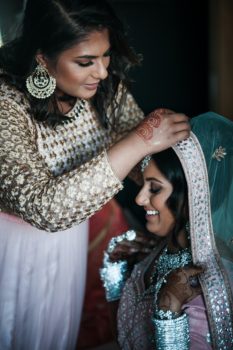Who is an Indian Aunty? Posted by Nicole Herbert Dean on Jul 2, 2021 in Culture
The Indian aunty चाची is not only your mother’s मां or father’sपिता जी sisters बहन- she is anyone to whom you want to give an honorific संमानित title. This could mean, your neighbor पड़ोसी next door, the lunch lady, your friend’s मित्र mom, etc.
I held this view growing up until recently would encourage प्रोत्साहित करना, my daughter, बेटी to call those in my network. That is until I read an article लेख describing how this term had transitioned from an honorific title to one of derision.
Who is an Aunty?
In his book पुस्तक, The Complete Study of Aunts, Rupert Christiansen writes that the term ‘auntie’ in the Oxford dictionary शब्दकोश was used for slightly older African American women who were servants नौकर.
The Times of India published an article in 1984 detailing how the term was also used in China to describe a maidservant. Senior officials used to have help at home. This seeming inequality went directly against Communism and hence the term पारिभाषिक शब्द effectively hid this fact.
P.G. Wodehouse, the British author details how awful भयंकर Aunties can be in his books.
Intimate Name Calling
Auntie is used in India as a term of familiarity and respect परिचित और सम्मान.
The word ‘aunt’ in Hindi is ‘chachi’. This term is given to your dad’s sister. Also, ‘maasi’ is the term given to your mom’s sister. However, many Hindi-speaking natives देशी do not know what the English term actually means. They have appropriated this term as a substitute विकल्प when there is no appropriate उचित honorific term.
Socio-linguist expert विशेषज्ञ, Probal Gupta, used this term as a metaphor रूपक for India’s relationship संबंध with English, noting that it was not ‘one of us’ but a language to which one must give respect आदर करना.
Today, not only do the neighborhood अड़ोस – पड़ोस kids use the term but even auto-rickshaw drivers संचालक and your local vegetable seller सब्जी बेचने वाला will as well.
People also call the brothel वेश्यालय madam and the lady who sells illegal वेश्यालय homemade moonshine ‘Aunty’.
‘Auntie’ is also an attitude रवैया. It is fierce, bold, uninhibited. Drag culture uses the term and an aunty could be a gay man or a woman who has no filters.
Nergis Dalal, a writer for Times of India, observed that the use of the term enabled Hindi speakers to transcend cultural barriers बाधाओं.
The term ‘Auntie’ is used not only among Indians abroad but also among Fijian blacks, Caribean natives, and any other culture that has close ties with India.
What is in a name?
‘Aunty’ meant to honor and respect सम्मान और सम्मान. That is, until recently when it has taken on a mocking मजाक and derisive tone.
Today, it is used to describe a group of women who have nothing better to do than interfere दखल नामा in their neighbor’s business. I have been listening to a popular podcast, ‘What would the Aunties say’. This podcast tackles restrictive प्रतिबंधक norms and cultural behavior that is established and enforced by the ‘Aunties’ of the Indian world. The show’s topics प्रतिबंधक range from auntie’s observations on gender inequality लिंग असमानता to bad karma. Anchal Seda, who is the host of the podcast has also published a book by the same title.
There are two sides to this term. On one side, the term indicates a person who is unafraid अभीत to say what she really thinks, lending authenticity सत्यता to the character. But on the other side, the receiver of the term may not be altogether thrilled रोमांचित at being addressed as it reveals age, and lack of relevance प्रासंगिकता when it comes to generation as viewed by the younger set.
So, we see clearly that this term has gone through subtle transitions बदलाव in meaning, starting out as a term that has a blurred honorific/derogatory meaning. Then transitioning to one of honor and finally in today’s culture taking on a nuance of mocking.

Build vocabulary, practice pronunciation, and more with Transparent Language Online. Available anytime, anywhere, on any device.




